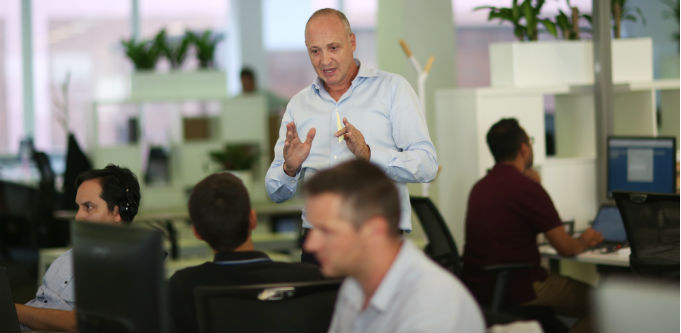
Mark Rohald and the Cluey team. Source: Supplied.
Edtech startup Cluey Learning has raised $20 million in Series A funding, to scale its personalised and data-driven learning technology designed to reimagine after-school tutoring.
The oversubscribed round was led by Allectus Capital and the Thorney Investment Group.
Cluey was founded, rather unusually, by Quartet Ventures, the investment firm of Sam Linz, Robert Gavshon and Mark Rohald, who is also chief executive of the startup.
Quartet provided initial anchor capital, and is also a repeat investors in this latest round.
“In the world we live in today, there is no better way to give confidence to outside investors,” Rohald tells StartupSmart.
The Cluey team started building out the strategy about 20 months ago, and went live with fee-paying customers in July 2018.
Although Rohald doesn’t reveal any specific user numbers, he does say the startup has seen “extensive demand”, including from more varied age groups and socioeconomic brackets than the founder expected.
“Individual children have individual learning needs,” Rohald explains.
Combining tutor contact with digital learning content, examples and practice exercises is intended to empower students to learn in the way most suited to them, and regardless of where they’re located.
“It’s a much more robust service,” he adds.
Powering up
According to Rohald, Cluey is now at a point where it’s preparing to scale.
The startup will be building out automated systems and processes using data analytics and artificial intelligence.
“We need to invest more heavily in deeper technology and learning content,” the founder says.
This funding will go towards “building out the platforms that enable us to optimise the learning for students”.
Cluey will also build on its academic team, to ensure quality control can scale as the rest of the business does.
This is a particularly exciting time to be growing an edtech startup, as interest in technology in this sector grows, Rohald says.
“But it’s unusual to see a level of investment required as substantial as ours, at such an early stage.”
Cluey had a significant initial investment committed from Quartet, and “scaled much more quickly than anticipated”, he adds.
“We needed to raise a substantial amount to really power the business.”
The round was oversubscribed, and so the startup selected two “very strong lead investors”, with different skill sets, but that were both focused on technology development.
Internally and on its advisory board, Cluey has “sufficient education knowledge”, Rohald says.
The challenge for this startup — and where Allectus Capital and the Thorney Investment Group can really add value — will be “how do we really scale at a phenomenal rate and maintain quality?”
“Gut is good, but data is better”
Having approached the investment process from both sides of the fence, Rohald is well placed to offer a few words of advice to other prospective founders.
First, “you need to have a very clearly articulated plan, and the plan must be supported with data”, he says.
Raising off the back of a hypothesis alone is “extremely difficult”, he says.
Even if you feel you have a great idea, spend the time, effort and money on doing market research to validate it. Consider the size of the market, the segment of that market you feel you can reach, and how long it will take you to reach them.
“It might not be easy to get that information, especially with a new product or service,” Rohald warns.
“But you can’t guess … You need to have fact,” he adds.
“Gut is good, but data is better.”
Second, Rohald advises if you can afford to, find a professional advisor to support your startup through the fundraising process.
This should be someone who has had experience in raising capital, and startups should look into, and talk to, the startups they have worked with in the past.
There are many advisors out there that will “promise the world”, Rohald says.
“You need to do your homework to make sure they’re the right fit.”
However, a good one can prove an invaluable helping hand when you’re trying to raise capital for an early-stage business.
The fundraising process is “like trying to change the engines and refuel the jet, while your flying with passengers”, he adds.
“This is a tension that exists with every chief executive … [an advisor] gives you a chance to continue running the business.”


COMMENTS
SmartCompany is committed to hosting lively discussions. Help us keep the conversation useful, interesting and welcoming. We aim to publish comments quickly in the interest of promoting robust conversation, but we’re a small team and we deploy filters to protect against legal risk. Occasionally your comment may be held up while it is being reviewed, but we’re working as fast as we can to keep the conversation rolling.
The SmartCompany comment section is members-only content. Please subscribe to leave a comment.
The SmartCompany comment section is members-only content. Please login to leave a comment.